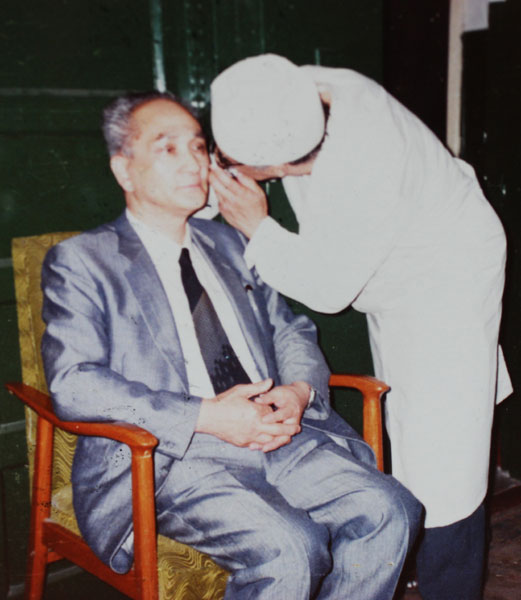 Liu Shiyue (right), conducts an eye checkup on Susumu Omiya, one of 120 Japanese medical staff who arrived to work at the hospital in 1951. Provided to China Daily |
"My wife's translation skills made it easier for me to communicate with the Japanese doctors, and I gradually came to realize that they were responsible, careful people. They were not the same as the Japanese invaders. My attitude toward them began to change, and I even made friends with several of them," Liu said. "One of them once called me from Japan just to tell me that he was excited because a Chinese team had won a table tennis competition in Japan."
Those Japanese visitors bonded with China and the hospital, according to Liu. They cared about the development of the country and the hospital, even after they returned to Japan, and many have returned several times to visit their former workplace and colleagues.
As confirmation of her husband's view, Fu quoted one of the returnees: "China is our second home. We love the Bethune International Peace Hospital and we miss our colleagues and comrades."
Susumu Omiya, one of the most frequent returnees, has visited China every second year since 1993, and she was instrumental in helping the hospital to establish a working relationship with the Saka General Hospital in Shiogama, Miyagi prefecture, Japan, in 1999.
"To us, the Japanese people are not the same as the Japanese invaders. We hate the invaders, and that will never change," Liu said. "But we also respect the Japanese people and made friends with those who worked with us."
According to Fu, one of her colleagues, Masako Torikai, once told her, "After the Japanese troops surrendered, the Chinese Communist Party recruited some Japanese medical workers like me, who had served in the Japanese army in Northeast China."
Most of those who remained were anti-war, and they chose to stay in China rather than return home. Torikai said she had seen the misery and pain the war had brought to the Chinese people. She wanted to help save lives, so she didn't hesitate to stay and join the PLA Army, according to Fu, who remembered her saying, "The Japanese and their Chinese colleagues are like siblings."
Bethune's legacy
The forerunner of the Bethune International Peace Hospital was founded in 1937 during the Japanese occupation. "I was honored to work there because it was partly established by Doctor Norman Bethune," said Liu, who worked at the hospital for half a century.
The name of Norman Bethune (1890-1939) is still famous throughout China because of the medical aid he provided for Chinese troops during the occupation. The Canadian physician, who arrived in China in 1938, treated both civilians and wounded soldiers. To provide better treatment for the troops, he expanded and relocated a small field hospital originally established by the Eighth Route Army, transforming it into a "Model Hospital" in the village of Songyankou, Shanxi province. A large number of physicians subsequently trained at the hospital and joined Bethune's rescue team.
